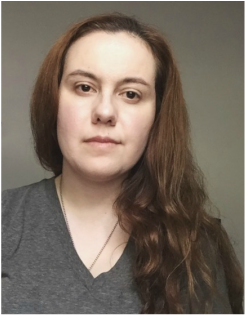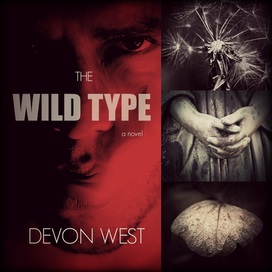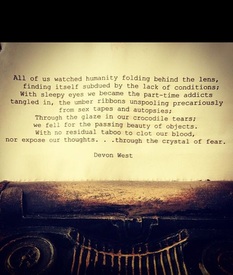
To start, shamelessly plug your book.
Thank you Lynn, for providing this space and opportunity. The Wild Type is a story that delves into rich imagery, the mystery of reality and time, thus the value to which we are submitted both as material and immaterial beings. It’s an up-close look at situations that cause a specific brand of discomfort. One that is vague and difficult to define, often leaving us with feelings that are distorted and disconnected from those around us, persisting in the form of actually doubting if anything even occurred. It mimics the dream while questioning reality.
You describe your novel as not corresponding to “typical genre fiction.” In what way does it differ from the norm?
I wrote it following an internal rhythm rather than an external one that is easily recognizable. I incorporated the element of atmosphere, and emotional texture, while also adding sparse moments that can be directly linked to the modern world.
What was your greatest influence in writing The Wild Type?
I would have to say the “Oedipus complex” as well as how ostracized environments both psychologically and physically can shape a human being. But beneath it all it’s a study on isolation, hence the title (because there are no human wild types) and the opening scene “The Rabbit People”. Each character questions their place in the world, by being confronted on a daily basis with the vastness that entails existing. Their experience of suffering is a deep seated wound, a hunger that can’t be met. But it also refuses to be ignored, so it seeks satisfaction through unhealthy outlets. I also explored the concept of “feeling different” some people subscribe to. On a side note, readers that are familiar with “Berenice” by Edgar Allan Poe will find hints of a similar theme.
Does your main character, Bianka, resemble you in any way?
No she doesn’t. Bianka originated as a character study I did when I was thirteen yrs. old, during a visit to a family members house, one of their in-laws had brought her two daughters, one of the little girls was around the age of four, and she wouldn’t stop staring at me from behind a half opened door, I found her unusual. I asked who she was, and I remember her mother said, ‘that one’s evil’. When I got home I did a written ‘portrait study’ of a teenage version of the little girl. But it would be a long time for her to resurface and make her way into my work.
If you decided to live in a remote cabin setting, what three things would you want with you and why?
A computer with no internet connection (only for writing) why? because typing allows the words to flow accordingly, when I write longhand, it forces me to slow down and sometimes that means things get lost in the process. Painting materials, because when I don’t write I switch to painting. And a camera, to document the experience.
When you sit down to write, what lights your fire?
The fire you mention is rarely lit sitting down, it happens before, while engaged in life. But most of the time the ignition is caused by things I find upsetting; so the fire is lit by anger.
Find out more about Author Devon West:
https://twitter.com/devonwestauthor
https://www.goodreads.com/user/show/52958692-devon-west
https://www.goodreads.com/user/show/52958692-devon-west
Thank you Lynn, for providing this space and opportunity. The Wild Type is a story that delves into rich imagery, the mystery of reality and time, thus the value to which we are submitted both as material and immaterial beings. It’s an up-close look at situations that cause a specific brand of discomfort. One that is vague and difficult to define, often leaving us with feelings that are distorted and disconnected from those around us, persisting in the form of actually doubting if anything even occurred. It mimics the dream while questioning reality.
You describe your novel as not corresponding to “typical genre fiction.” In what way does it differ from the norm?
I wrote it following an internal rhythm rather than an external one that is easily recognizable. I incorporated the element of atmosphere, and emotional texture, while also adding sparse moments that can be directly linked to the modern world.
What was your greatest influence in writing The Wild Type?
I would have to say the “Oedipus complex” as well as how ostracized environments both psychologically and physically can shape a human being. But beneath it all it’s a study on isolation, hence the title (because there are no human wild types) and the opening scene “The Rabbit People”. Each character questions their place in the world, by being confronted on a daily basis with the vastness that entails existing. Their experience of suffering is a deep seated wound, a hunger that can’t be met. But it also refuses to be ignored, so it seeks satisfaction through unhealthy outlets. I also explored the concept of “feeling different” some people subscribe to. On a side note, readers that are familiar with “Berenice” by Edgar Allan Poe will find hints of a similar theme.
Does your main character, Bianka, resemble you in any way?
No she doesn’t. Bianka originated as a character study I did when I was thirteen yrs. old, during a visit to a family members house, one of their in-laws had brought her two daughters, one of the little girls was around the age of four, and she wouldn’t stop staring at me from behind a half opened door, I found her unusual. I asked who she was, and I remember her mother said, ‘that one’s evil’. When I got home I did a written ‘portrait study’ of a teenage version of the little girl. But it would be a long time for her to resurface and make her way into my work.
If you decided to live in a remote cabin setting, what three things would you want with you and why?
A computer with no internet connection (only for writing) why? because typing allows the words to flow accordingly, when I write longhand, it forces me to slow down and sometimes that means things get lost in the process. Painting materials, because when I don’t write I switch to painting. And a camera, to document the experience.
When you sit down to write, what lights your fire?
The fire you mention is rarely lit sitting down, it happens before, while engaged in life. But most of the time the ignition is caused by things I find upsetting; so the fire is lit by anger.
Find out more about Author Devon West:
https://twitter.com/devonwestauthor
https://www.goodreads.com/user/show/52958692-devon-west
https://www.goodreads.com/user/show/52958692-devon-west


 RSS Feed
RSS Feed
